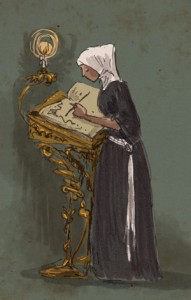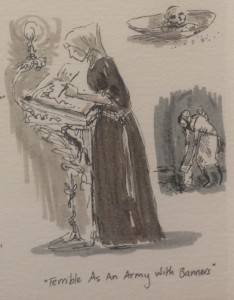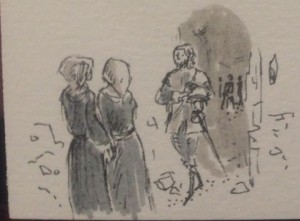
Kathleen’s final cover art
This is the story that always make me cry, so I can never read it out anywhere or I’ll end up as a snotty, blubbering mess. It’s a mix of letters and diary entries; it starts with one sister writing to another, and I channelled my relationship with my own sister when I wrote this. We are very different, but very close … but very different. We frequently look at each other with that dreadful astonishment that we came from the same parents, not least because she is obsessed with sport and I consider opening a book sufficiently sport-like to count as exercise. But I love my sister very dearly, and what I wanted Goda’s words to echo is what I feel about my sister: that even though we are so different we will always be sisters, our blood will always be shared, and that family flows through you whether you want it to or not.
Many years ago I read Eco’s The Name of the Rose; the monk Adso describes the peasant girl as ‘terrible as an army with banners’, and I thought it a most beautiful phrase. Years and more reading showed that it was originally from The Song of Solomon. I still love it; I used the phrase in my version of “Bluebeard”. The other translation, ‘terrible as an army arrayed for battle’, just seems to miss the right beat, doesn’t quite have the same beauty, although ‘arrayed’ is a beautiful word.
I find the phrase evocative and resonant, so much so I used it as the title of this story, which also owes some of its DNA to Eco’s wonderful book. I adore the idea of libraries, especially of medieval libraries as bastions of learning, as the places where knowledge was kept safe during the ‘Dark Ages’ (even though some of Eco’s monks let it get out of hand). What I like about my nuns at the Citadel of Cwen’s Reach is their determination to keep knowledge in the world because, good or bad, one day it might be needed. This is also the tale of a terrible destruction; it’s a chronicle of ending; it’s a letter of farewell, but, I pray, it’s also a statement of stubborn hope.
Terrible As An Army With Banners

Kathleen’s art
Dearest Elswide,
This is written in haste for the last boat is departing soon and I will not be on it, although I hope this will be. I beg you keep safe these pages, for they record an end – such an end, sister! Such an end – and I would have this chronicle kept safe. If you can, have it copied and sent forth so it may be found and read, and the truth of our demise – the last days of the Citadel at Cwen’s Reach – known.
You did not agree with my decision, sister, when I left home and joined the order. I know our silences have been long and fraught, but you are my blood and that counts for much. Your children are my family, too, and they should be told what I have done. They should know who the Little Sisters of St Florian were and they should be proud, though soon some will try to erase us from the world’s memory. Elswide, I did not desert you, I did not betray our shared heritage by leaving. I followed the path that was, to me at least, obviously laid out before me, but you have ever been in my thoughts. I’ve not forgotten you.
Please know that I have never regretted my decision, not even now when the end is upon me, not even when I can hear the sound of the siege engines at the gates. Know that I did the right thing and that my place was always meant to be as part of this community. I was always meant to have a quill in my hand and my nose pressed close to a blank page that begged to be covered with words. I was always meant to be here at the end. I write this knowing that I am a thing, a final thing, an omega.
Do not despair, sister, for in all endings there are new beginnings; from fire there comes new life, and from chaos, creation.
Your sister,
Goda
Amanuensis to Mater Dylis, last Mother Abbess of the Little Sisters of St Florian, The Citadel at Cwen’s Reach
*

Kathleen’s art
Know all you who read this that it is the recounting of the last days of the Citadel at Cwen’s Reach, the home for centuries past of the Little Sisters of St Florian, and their innermost circle the Blessed Wanderers, the Murcianii, whose diligence and bravery have brought so many books to us and therefore prevented their loss to the world. I write this now as events draw to a close – I would that you could hear the things I do as my pen scratches across the page: the roar of canons, the crackle of flames, the sounds of men dying in the streets outside our walls. All you need know of me is that I am Goda, Amanuensis to Mater Dylis, who shall be our last mistress. I have lived here for almost fifteen years, at first as a postulant, then as a novice, finally as a full Sister and scribe – not as one of the wanderers, though, for I was never so blest – but I have faithfully served as I may.
Know also that the Citadel has been a refuge for women of all ages, from all walks of life, those who fled and looked for something better. Some found a place with us, others rested and recovered and learned the skills to set them on a newer, safer path. Some came to seek the counsel of the most sacred Beatrice – although at the time they did not know it for her existence has always been a closely guarded secret – who has given guidance to our Maters for so many, many years. Some came to learn, some to teach. Some came for the wrong reasons but, in the end, learned the right ones. Others still came to us for the balm of eternal sleep and it was given with tenderness and compassion.
We have been a repository, a shrine, a home, a fortress. We have been a beacon of learning, custodians of knowledge that might otherwise have passed away. Until now we have been unbiased in what we have preserved. Until now we have never knowingly destroyed any book, but circumstances have removed the luxury of such openness and inclusion.

Kathleen’s art
For centuries, wars and battles have been waged around us by lords and kings, petty and powerful, forgotten and renowned, yet we remained inviolate, neutral, untouched by these ructions. Requests have been made of us by these rulers, and our decisions to either grant or refuse access to volumes or scrolls or other such records, have been accepted and respected, if not happily received. Our walls have never been breached, we have never been attacked, and no man has ever set foot in the shrine of the caput mundi.
But now this man, this strange man, this darkness made flesh of whom Beatrice warned us almost too late, is coming. This terrible man who, it is whispered, has lived well beyond his time. This man who has refused to take no for an answer.
***

